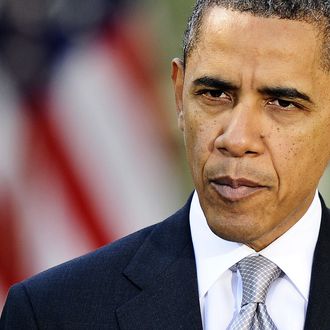
The failure of the supercommittee to solve the long-term deficit problem has prompted a wave of reporting and commentary on the general theme, which says that it is very sad that the two parties can’t put aside their differences to reduce the deficit, and What Will the Markets Say?, and Think of the Children. What all this misses is that there is not going to be a bipartisan agreement to reduce the deficit. Why not? Because you can have a bipartisan agreement when two parties disagree about solutions to the same problem. You can’t have a bipartisan agreement when they don’t agree on what the problem is.
You simply have to listen to what Republicans say. Republicans say over and over that the government “spends too much and taxes too much.” They abhor the “deficit,” but they don’t define this as the gap between revenue and outlay. This is simply a term they have taken up to mean big government. If your diagnosis of the problem is that the government taxes too little and spends too little, then you’re not really concerned with reducing the deficit.
And if you look at everything Republicans have done for twenty years, it drives home the point. George H. W. Bush, in the last gasp of old-fashioned Republican fiscal conservatism, cut a deal with Democrats to raise taxes and cut spending. Conservatives revolted against the deal and continue to this day to vow never to let such a thing happen again. They refused to negotiate with Bill Clinton in 1993 when he insisted that his deficit reduction include higher taxes on the rich. When they took over in 2001, they undid budgetary rules requiring any new tax cuts or entitlement spending be offset with tax hikes or spending cuts and proceeded to run up the deficit. The only time they actually agreed to a bipartisan deal with President Obama was in order to approve spending he wanted (for unemployment benefits) in return for extending the Bush tax cuts another two years.
The Republicans are an anti-tax party. They may describe themselves as opposed to the deficit. And it is true that they would like to cut spending. But the anti-spending impulse is purely to enable the goal of lower taxes. There is nothing in their behavior over the last twenty years that shows the slightest interest in a bipartisan agreement to reduce the deficit. Nor is there any recent evidence. Democrats have continued to offer agreements to reduce spending, including on entitlements, in return for higher tax revenue, which they’re willing to accept in the form of lower tax credits as opposed to higher rates. Obama kept trying to sell this to the House Republicans, and supercommittee Democrats kept trying to make the same sale.
The news media is working desperately not to convey this reality. (See Greg Sargent and Derek Thompson on the phony pox-on-both-houses reporting.) Objectivity requires telling a story that blames both parties in equal measure. The actually objective way to do this would be for reporters to avoid taking a position on whether it’s good to cut the deficit this year, and then to accurately convey the reality that Democrats are willing to compromise to cut the deficit and Republicans aren’t.
Instead the news media is openly rooting for the goal of cutting the deficit this year, which forces them to obscure the positions of the two parties so that the story can be one of shared blame. For a representative sample, look at this piece in today’s New York Times. It pines for the two sides to accept a bipartisan budget deal with $2.2 trillion in higher taxes and $2.6 trillion in lower spending. It doesn’t mention that this deal is far more left-wing than any of the offers Democrats have made and Republicans have rejected.
The only offer Republicans have made involves locking in the Bush tax cuts in return for about $290 billion over a decade — increasing revenue by less than 1 percent. In return for that, it would lock in the Bush tax cuts and assure lower tax rates for the very rich. That’s a sensible deal for a party that values low taxes over everything else. But it’s not a sign of a party interested in compromising to reduce the deficit.






























